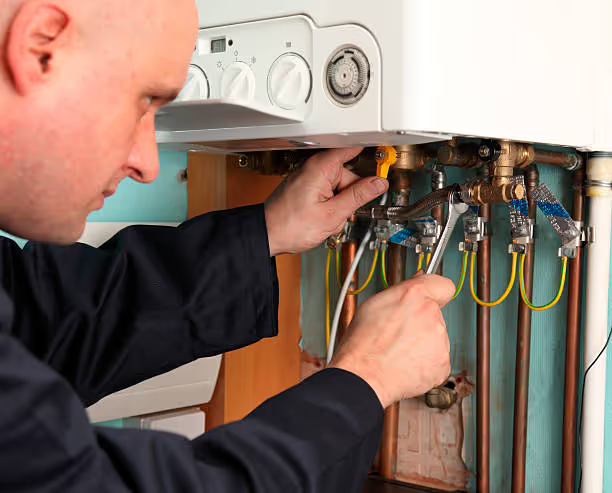Water Heater Replacement in Westchase, FL

Is your Westchase, FL home's hot water supply unreliable? This guide details key signs your water heater needs replacement, including advanced age, leaks, or inconsistent output. Explore modern, energy-efficient options like tankless, hybrid, and conventional storage heaters, helping you select the best fit. Our meticulous water heater replacement process ensures safe removal and expert installation. Upgrading provides superior energy efficiency, consistent hot water, and enhanced safety, securing comfort and peace of mind for years.

Water Heater Replacement in Westchase, FL
A reliable supply of hot water is essential to the daily rhythm of any Westchase home, powering everything from morning showers and dishwashing to laundry. When your water heater begins to fail, it disrupts your entire routine, creating stress and inconvenience. While some issues can be resolved with a repair, many signs point toward the end of a unit’s service life, making replacement the most practical and cost-effective long-term solution. Investing in a new, modern water heater not only restores comfort but also enhances your home's energy efficiency and safety.
Decisive Signs Your Water Heater Needs Replacement
It can be difficult to know whether to repair or replace your water heater. If you notice any of the following signs, it is likely time to consider a full replacement to avoid a sudden breakdown or potential water damage.
- Advanced Age: A conventional storage-tank water heater typically lasts between 8 and 12 years. If your unit is approaching or has surpassed this age range, it is operating on borrowed time, and its efficiency is likely declining significantly.
- Visible Corrosion or Rust: Any rust on the tank itself, particularly around fittings or seams, is a serious red flag. Rusty or metallic-tasting hot water also indicates that the inside of the tank is corroding and could fail soon.
- Persistent Leaks: While a leak from a fitting or valve might be repairable, any water pooling around the base of the tank itself usually signifies an internal breach. This is an unfixable problem and requires immediate replacement to prevent major water damage.
- Loud or Unusual Noises: Over time, sediment builds up at the bottom of the tank. As this sediment hardens, it can cause the unit to make rumbling, banging, or popping sounds during heating cycles. This not only reduces efficiency but also puts stress on the tank, leading to cracks.
- Inconsistent Hot Water Supply: If your water heater struggles to produce enough hot water for your family’s needs, or if the water doesn't get as hot as it used to, the heating elements may be failing or the unit may be too inefficient to keep up.
- Frequent and Costly Repairs: If you find yourself scheduling repairs every year, the cumulative cost and inconvenience will quickly outweigh the investment in a new, reliable unit.
Exploring Your Water Heater Options for a Westchase Home
Technology has evolved, offering Westchase homeowners several types of water heaters to choose from. The right choice depends on your household size, energy source, budget, and long-term efficiency goals.
Conventional Storage Tank Water Heaters
This is the most common type of water heater, storing and pre-heating a specific volume of water (typically 40-50 gallons) in an insulated tank. They are available in both electric and natural gas models.
- Advantages: Lower initial purchase and installation cost, proven technology, and straightforward operation.
- Considerations: They experience standby heat loss as the stored water cools, leading to lower energy efficiency. The hot water supply is limited to the tank's capacity.
Tankless (On-Demand) Water Heaters
Tankless water heaters heat water instantly as it flows through the unit, eliminating the need for a storage tank. This provides a continuous supply of hot water.
- Advantages: Significant energy savings (up to 30-40%) since they only heat water when needed. They have a much longer lifespan (20+ years) and a compact, space-saving design.
- Considerations: The initial investment is higher than for a tank model. The unit’s flow rate determines how many fixtures can be used simultaneously. Gas models often require specific venting and larger gas lines.
Hybrid (Heat Pump) Water Heaters
These units combine a traditional electric storage tank with a heat pump that pulls warmth from the surrounding air and transfers it to the water. They are the most energy-efficient option available.
- Advantages: Drastically lower electricity consumption, resulting in substantial long-term savings on utility bills. They are an environmentally friendly choice.
- Considerations: They require more vertical clearance than standard models and need adequate airflow to function efficiently. The upfront cost is the highest among these options.
Our Meticulous Water Heater Replacement Process
A proper water heater installation is critical for safety, performance, and longevity. Our process is designed to be thorough and transparent, ensuring every step is handled with professional care and in compliance with all Westchase and Hillsborough County codes.
- Comprehensive Assessment: We begin by evaluating your current system, discussing your household’s hot water usage, and understanding your efficiency goals and budget. This allows us to recommend the ideal type and size of water heater for your specific needs.
- Safe Removal and Disposal: Your old water heater is carefully disconnected from the water, gas, or electrical lines. The tank is then safely drained and removed from your property for responsible disposal.
- Expert Installation: The new unit is precisely positioned and secured. Our technicians make all necessary plumbing connections, ensuring they are watertight and secure. For gas models, we meticulously connect gas lines and ensure proper venting. For electric models, all wiring is handled according to strict safety codes.
- System Testing and Calibration: Once installed, we fill the new tank, purge all air from the lines, and activate the unit. We test the temperature and pressure relief valve, check for leaks, and calibrate the thermostat to ensure optimal and safe operation.
- Final Walkthrough and Cleanup: We leave your space as clean as we found it. We will walk you through the operation of your new water heater, explain any maintenance requirements, and answer all of your questions.
The Lasting Advantages of a New Water Heater
Upgrading your water heater is an investment that pays dividends in multiple ways. A modern unit provides more than just reliable hot water; it delivers enhanced value and peace of mind. Key benefits include superior energy efficiency, which translates directly to lower monthly utility bills, and the unwavering consistency of a system that can meet your family's demands without interruption. Furthermore, new water heaters are built with advanced safety features, such as improved pressure relief valves and thermostats, reducing risks and ensuring your home is protected. With robust manufacturer warranties and a longer operational lifespan, a professional replacement secures your comfort for years to come.











